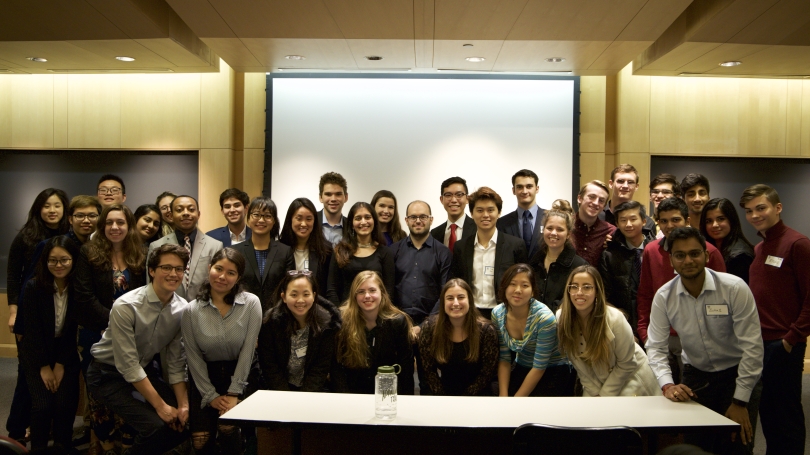
- Public Policy
- Leadership
- Funding
- News & Events
- About the Center
Back to Top Nav
Back to Top Nav
Back to Top Nav
Back to Top Nav
As the leader of the Dartmouth delegation traveling to the 19th Ivy Leadership Summit at the University of Pennsylvania, I expanded my leadership in an unexpected way; leading a group of students to a new campus in a 9-hour road trip was a new experience. No longer in a classroom and an educational setting, it was a challenge to get strangers to be comfortable with each other in a cramped van. I also had to make it clear that there were expectations for us to be respectful and professional, as Dartmouth representatives. I went from being a discussion facilitator to an almost chaperone-like authority, and it was hard to jump between the stricter necessities of being punctual with open-minded debates on sustainability.
The conference was also an extremely valuable experience, as we got to hear about sustainability from two amazing keynote speakers. Opening the conference was Dr. Hiroko Oura, a senior economist at the IMF, and we learned about sustainable investments in the financial world. We also learned from a Dartmouth alum, Susan Golden ’84, about the actions we could and should take as leaders of the next generation. This conference was my fourth Ivy Council conference, and it is always interesting to see how each school uniquely prepares a distinctively engaging conference. My first conference was during freshmen fall, hosted by Princeton, where we heard Presidential Candidate Andrew Yang speak on entrepreneurship. Cornell hosted the second conference, where we learned from ACLU representative on how we could take action to change policy. The third conference I hosted myself right here at Dartmouth last fall, and we had Uyen Tieu, the general manager of Great Big Story CNN speak of being a woman in an executive position. Although each conference focuses on leadership and bouncing ideas off of students from the various schools, the fact that each school has its own unique culture and facilities always makes each experience valuable and educational.
For example, the size of the school often plays an interesting role, as I found out at one of my breakout session workshops. Led by the University of Pennsylvania’s president of their nonpartisan voter turnout club, we discussed the different strategies similar clubs used to increase voter turnout. A similar trend had been the occasional aggressive pushing, causing potential voters to be wary and annoyed about the voting process. Knocking on student dorm rooms had a huge backlash at University of Pennsylvania, similar to how sometimes students at Dartmouth are deterred from politics by the aggressiveness of our democrat party club in getting voters registered. Regardless of the method, the issue is an important one and everyone brainstormed how different tactics worked in different environments. For example, in the larger school of University of Pennsylvania, they have multiple voting stations within the campus, sometimes within larger dorm buildings. To attract people, they give free food. At Dartmouth, where the polls are stationed in a nearby high school, we provide free rides. However, because our campus is much more concentrated and we have a smaller student body, it feels as though there is less division on voting and that once voting day comes around, a lot of people do vote. Maybe it’s peer pressure or that advertisement is successful on FFB and campus-wide emails. I thought it was really interesting how different factors affect same issues across the schools.
-Submitted by Sarah Chong '21, Rockefeller Center Mini Grant Recipient
The Rockefeller Center's Mini-Grants program funds registration fees for students attending conferences, as well as the costs of bringing guest speakers to Dartmouth. The views and opinions expressed here are the author’s own and do not necessarily represent the views and opinions of the Rockefeller Center or constitute an endorsement by the Center.